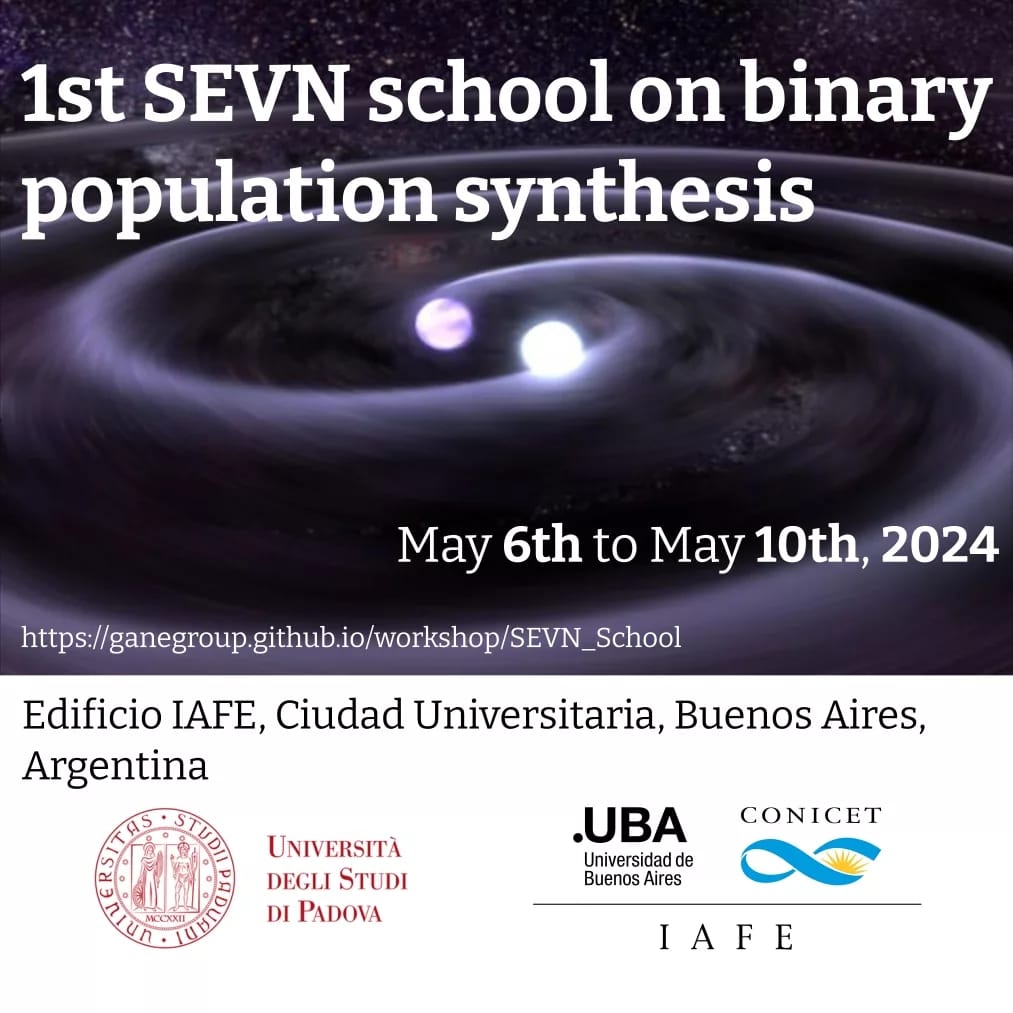1st. SEVN School on Binary Population Synthesis

Rationale
SEVN (Stellar EVolution for N-body) is a recently developed, updated and public code to compute single and binary population synthesis. Most of the public population-synthesis codes rely on the same models for stellar evolution, which limits the capability to explore the differences and uncertainties that arise from stellar evolution theory. SEVN overcomes this issue implementing a different paradigm by interpolating stellar evolutionary tracks pre-computed with hydrostatical codes like MESA or PARSEC, and using updated prescriptions for the processes undergoing in interacting binaries.
In particular, SEVN was used to study the formation channels of binary compact objects progenitors of gravitational waves, the chemically homogeneous stellar evolution, the impact of different prescriptions of common envelope and mass transfer on the orbital properties of the binaries, and many other aspects of binary evolution.
SEVN is fully written in C++, following the Object Oriented Paradigm. This allows to include the binary evolution as a library in other codes (e.g. in codes for cluster dynamics). In this way stellar evolution can be taken into account in simulations of different astrophysical contexts. Its modular implementation also allows the user to easily include new prescriptions to study other types of populations.
The School aims to introduce and/or enhance the skills of the students in population synthesis by learning to use SEVN. It consists in lectures providing the tools to run and analyze SEVN simulations and many hands-on sessions guiding the participants in a typical analysis made with SEVN, as for example the study of the demography of binary black holes.
Organizers:
Gastón J. Escobar (University of Padova)
Giuliano Iorio (University of Padova)
Leonardo J. Pellizza (IAFE)
Susana E. Pedrosa (IAFE)
Lecturers:
G. Iorio (University of Padova)
G. Escobar (University of Padova)
Dates:
May 6, 8, 9, and 10
Venue:
Institute for Astronomy and Space Physics
(University of Buenos Aires / National Research Council)
Edificio IAFE, Ciudad Universitaria, Buenos Aires, Argentina
School program:
| Monday May 6 | Wednesday May 8 | Thursday May 9 | Friday May 10 | |
|---|---|---|---|---|
| 10:00-10:30 | Installing SEVN | |||
| 10:30-12:00 | Lecture 1 SEVN intro. ICs. SICS. | Lecture 3 Tools for output analysis. | Hands-on 2 | Hands-on 5 |
| 12:00-13:30 | Lunch | Lunch | Lunch | Lunch |
| 13:30-15:00 | Lecture 2 Running SEVN. Main parameters. | Talk at IAFE | Hands-on 3 | Hands-on + report |
| 15:00-15:30 | Coffee | Coffee | Coffee | |
| 15:30-17:00 | Hands-on 1 | Hands-on 4 | Hands-on + report |
Deadline: 29th of March
Contact email address:
pellizza@iafe
gastonjavier.escobar@unipd.it
This event is organised in the context of the “Giornate CUIA 2024”. The organisers acknowledge financial support from CUIA and from the European Research Council (ERC Consolidator grant DEMOBLACK under contract no. 770017) for the project “Studio della formazione ed evoluzione di sistemi stellari massivi nell’Universo nell’ambito di una collaborazione Italo-Argentina”.